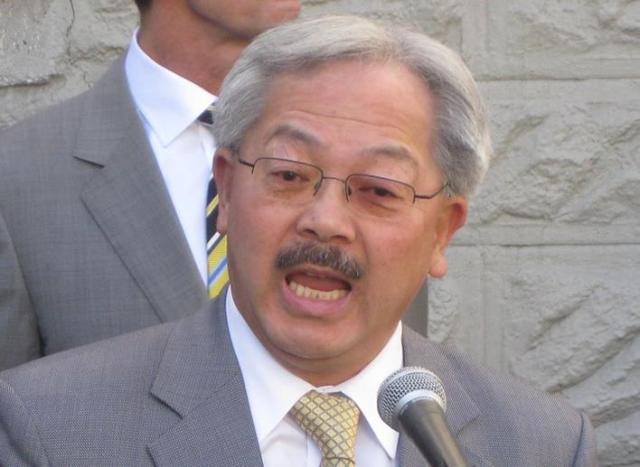
By Tim Redmond
NOVEMBER 6, 2014 – My Twitter stream was full of Willie Brown on Election Night. The former mayor doesn’t tweet, as far as I know, but his comments at Mayor Ed Lee’s party had everyone talking.
Among other things, he pretty much announced that the mayor would run for re-election (and since Willie told him to run the first time, I get that makes it final). And he said that the mayor was having a great night, since the voters did exactly what the mayor told them to.
Well, not all of the voters – the Campos-Chiu race is still up in the air, and will be very close at the end. At least, it will if past patterns on Election Day absentees continue. But there’s no denying that the ballot measures the mayor supported won, and the ones he didn’t fared more poorly.
But I don’t think it was the mayor, so much, as the mayor’s big-money backers. Mayor Lee may or may not have sway with the voters – but he clearly managed to line up a bunch of very rich people and big corporations and get them on board with his agenda. He has overseen the creation of a new local oligarchy.
If you look at the Ethics Commission filings on the election, you see that on the races the mayor cared about, a small collection of corporations and tech billionaires wrote very big checks. Prop. A got $200,000 for Sean Parker, and $50,000 from Ron Conway.
A new group called – seriously – the Committee for a Brighter San Francisco Future, funded largely by Pacific Gas and Electric Co, the SF Association of Realtors, and the Committee on Jobs, put more than $100,000 into Yes on A, C, I, J and K – all measures the mayor backed. Prop. I was funded almost entirely by the Fisher family, the heirs to the GAP fortune who for some reason like artificial turf fields.
The minimum wage measure, Prop. J, also backed by Lee, got its biggest money not just from labor but from Ron Conway. Prop. K, which started out as a measure that would have restricted market-rate housing development unless the city was building enough affordable housing, became a compromise policy statement – that passed with money from PG&E, the realtors, and all the big developers in town.
So the mayor has managed to create a fund-raising machine that can mobilize to support what he wants – and to oppose anything he doesn’t. That gives him a lot of power – but it’s not related to his personal job performance as much as it is to his friendliness with big corporations and rich tech people.
And underneath it all, there’s still a very clear current of unhappiness in the city.
I won’t try to spin or sugar-coat progressive losses. We didn’t pass Prop. G. But let’s look at the numbers. Prop G, the anti-speculation tax, had pretty much everything going against it. The landlords – including out-of-town real-estate groups – put more than $1 million into a No on G campaign. The proponents raised only a tiny fraction of that.
The ballot question was framed in a way that almost guaranteed people who knew nothing about it would be dubious. The Democratic Party supported Prop. G – but put a description on its slate card that made it sound unappealing.
Ballot measures with all of those disadvantages tend to get crushed.
But 45 percent of the voters went for Prop. G – a tribute both to the amazing grassroots effort the campaign put together but also to the simmering discontent and fear among tenants in this city. If the ballot question and the DCCC description had said “anti-speculation tax” or “tax on housing speculators,” Prop. G might very well have won.
I know Ed Lee is popular, on paper and in some polls. But the majority of this city still rents, and now that Prop. G has gone down, and the Campos legislation mandating higher payouts for Ellis Act evictions is in legal limbo, the evictions and wholesale assault on neighborhoods is going to continue unabated. And the mayor has nothing to offer to fix that.
And let’s remember: Turnout was low.
So yeah, in the short term, it may have been Ed Lee’s night. But I don’t think he walks away from this election with a mandate. I think he walks away as the guy who has the landlords, PG&E, and the developers on his side – and that’s not necessarily a great place to be in the next mayoral race.





